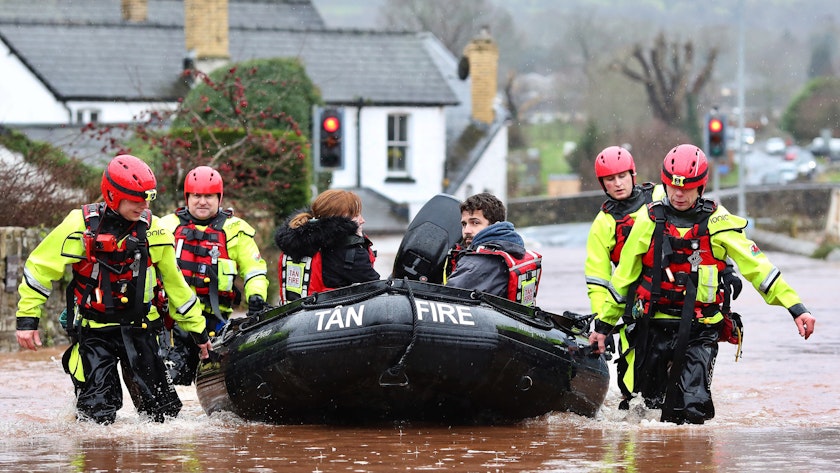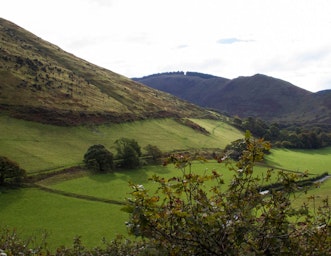
As global leaders gather in Dubai for the start of the UN climate talks, CAT’s Paul Allen explores some of the key issues and looks ahead to what we can expect to see over the next two weeks.
The COP28 climate talks starting this week in Dubai represent a critical milestone for keeping planet Earth a habitable home for both humans and the wider natural world. Record extreme weather events such as wildfires, floods, storms and droughts are no longer future worries, but are happening now across the globe – and could become much worse.
The landmark international agreement to limit global heating to ‘well below’ 2°C and to aim to stay within 1.5°C was adopted in 2015 at COP21 in Paris by almost every country in the world. The process to achieve these goals was based on each country offering ‘nationally determined contributions’ (NDCs), which are essentially voluntary pledges to be ramped up as the process moves forward. Every year since COP21, the process has urged governments to increase their voluntary pledges.
The Global Stocktake
This year’s climate talks see the completion of the COP process’s first ‘Global Stocktake’, which is designed to take place every five years to evaluate progress towards the Paris Agreement goals, highlight key gaps, and help inform the next round of NDCs.
As part of this Global Stocktake, a synthesis report was published in September, offering an assessment of progress. Key findings include that “global emissions are not in line with modelled global mitigation pathways consistent with the temperature goal of the Paris Agreement, and there is a rapidly narrowing window to raise ambition and implement existing commitments in order to limit warming to 1.5°C above pre-industrial levels.” The report is clear that countries need to commit to more ambitious emission reduction targets and support transformational change across all sectors.
This is also made clear in the latest UN Emissions Gap Report 2023: Broken Record, published on 20 November 2023. It offers clear evidence from world’s independent scientists that both global climate events and global emissions are breaking new records, and we are heading for a temperature rise far above the Paris Agreement goals, unless countries increase their pledges and take “immediate and unprecedented mitigation action in this decade.”
The impacts of not raising ambition to meet the demands of the Global Stocktake are clear on many levels. Impacts on nature and biodiversity, impacts on humans, but also impacts on the global economy from rising costs of both the direct loss and damage and the growing need to build adaptation infrastructure. Many of these costs fall on majority world countries which have contributed very little to causing the problem.

A question of ambition
The COP28 climate talks urgently need to drive a shift away from oil and gas to a rapid global scale-up of solutions. The solutions we need already exist and are ready to go. CAT’s Zero Carbon Britain research shows that we already have the technologies we need – a conclusion that is backed by a growing range of researchers.
A recent policy brief by Oxford’s Smith School of Enterprise and the Environment makes a clear case that Britain’s energy needs could be met entirely by wind and solar. Their work shows that these technologies could provide significantly more energy than the highest energy demand forecasts for 2050 and nearly ten times our current electricity demand. Lead author Dr Brian O’Callaghan stated: “This is a question of ambition rather than technical feasibility.”
In addition to being technically proven, the prices for wind, solar power and storage have been falling at a rapid rate. A report published in September by the Berlin-based Mercator Research Institute on Global Commons and Climate Change showed that, in the past decade, the cost of electricity from solar has fallen by 87 percent, and the cost of battery storage by 85 percent. Wind power and heat pumps are also seeing sharp falls in prices.
What can we expect from COP28?
We urgently need transformational action that will radically and rapidly reduce emissions around the globe and help to create a safer, healthier, fairer and more sustainable world for all.
Ambitious action plans at COP28 could benefit all nations, both by avoiding extreme climate impacts and by unleashing a wide range of co-benefits such as good jobs, better diets, cleaner air, improved public transport, income from community-owned renewables, and much more.
Global leaders must commit to ending dependence on coal, oil and gas and accelerating the switch to renewable energy as part of a just transition. We need ambitious plans for reducing energy demand in buildings, transport and industry, for scaling up clean energy production, and for transforming diets and the way we use land.
Other critical factors at COP28 include getting the Loss and Damage fund up and running to support countries being impacted by rising global temperatures, recognising that many of these countries are the least responsible for greenhouse gas emissions. This fund was established at last year’s UN climate talks in a landmark agreement, but isn’t yet operational.
Negotiations on scaling up climate finance to support developing countries in the transition to zero carbon are also expected to dominate. Developed countries failed to meet a target agreed in 2009 to provide $100bn of climate finance annually by 2020, and agreement and trust on climate finance is likely to be a key sticking point.
Action at all levels
Commitments and action from the world’s governments are vital to tackling the climate emergency at the scale and speed required – but we also need action at all levels to create transformational change.
From national governments to local councils and from communities and individuals to businesses and organisations – we can all work together to create the better world we know is possible. By putting pressure on governments, by taking action in our communities and workplaces, by doing what we can in our own lives, we can start creating that world in the here and now.
As an environmental education charity, CAT provides knowledge, skills and inspiration to help people and organisations to take action on climate and biodiversity. If you would like to build your skills and knowledge, take a look at our short courses and postgraduate degrees, and if you would like to support our work, please consider becoming a member today.
About the author
Paul is CAT’s Zero Carbon Britain Knowledge and Outreach Coordinator. He has been involved with our research into zero carbon scenarios since the beginning, coordinating the development of research reports and liaising directly with government, industry, NGOs and the arts to share findings.
- Zero Carbon Britain
- Climate Change
- Policy
- News Feed
Related Topics
Related Pages
EMAIL SIGN UP
Keep up to date with all the latest activities, events and online resources by signing up to our emails and following us on social media. And if you'd like to get involved and support our work, we'd love to welcome you as a CAT member.



